Related Research Articles

Lowndes County is a county located in the south-central portion of the U.S. state of Georgia. As of the 2020 census, the population was 118,251. The county seat is Valdosta. The county was created December 23, 1825.
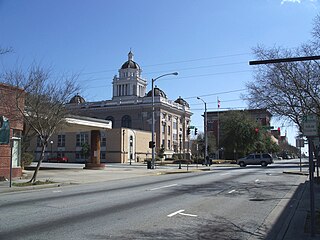
Valdosta is a city in and the county seat of Lowndes County in the U.S. state of Georgia. As the principal city of the Valdosta metropolitan statistical area, which in 2020 had a metropolitan population of 148,126, its metropolitan area includes Brooks County to the west. With a city population of 55,378 in 2020, Valdosta is the home of Valdosta State University, a regional university in the University System of Georgia with over 12,000 students as of 2015.
Enbridge Inc. is a Canadian multinational pipeline and energy company headquartered in Calgary, Alberta, Canada. Enbridge owns and operates pipelines throughout Canada and the United States, transporting crude oil, natural gas, and natural gas liquids, and also generates renewable energy. Enbridge's pipeline system is the longest in North America and the largest oil export pipeline network in the world. Its crude oil system consists of 28,661 kilometres of pipelines. Its 38,300 kilometre natural gas pipeline system connects multiple Canadian provinces, several US states, and the Gulf of Mexico. The company was formed by Imperial Oil in 1949 as the Interprovincial Pipe Line Company Limited to transport Alberta oil to refineries. Over time, it has grown through acquisition of other existing pipeline companies and the expansion of their projects.
"Troupville" is an extinct unincorporated community in Lowndes County, Georgia, United States, near Valdosta. Troupville was a riverboat landing near the confluence of the Withlacoochee River and the Little River at the uppermost navigable point. It was the third county seat of Lowndes County. Troupville was named after Governor George Troup.
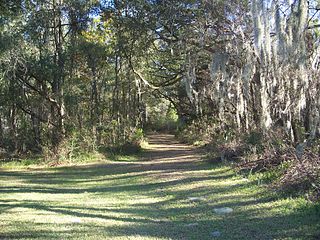
The Marjorie Harris Carr Cross Florida Greenway is a protected green belt corridor, more than one and a half miles (1.6 km) wide in places, that was the former route of the proposed Cross Florida Barge Canal. It is named for the leader of opposition to the Cross Florida Barge Canal, Marjorie Harris Carr, and was originally a U.S. Army Corps of Engineers canal project to connect the Gulf of Mexico and the Atlantic Ocean across Florida for barge traffic. Two sections were built, but the project was ultimately cancelled because of local opposition related to environmental concerns, including protecting the state's water supply and conservation of the Ocklawaha River Valley ecosystem, as well as national opposition for the costs being perceived as "government waste" with "limited national value." The greenway is part of the system of Florida State Parks, including the Santos Trail System, and is managed by the Florida Department of Environmental Protection.

Florida Power & Light Company (FPL), the principal subsidiary of NextEra Energy Inc., is the largest power utility in Florida. It is a Juno Beach, Florida-based power utility company serving roughly 5 million customers and 11 million people in Florida. It is a rate-regulated electric utility that generates, transmits, distributes and sells electric energy. In 2020, the company was ranked as the nation's most reliable electric power utility for the fifth time in six years.
The Floridan aquifer system, composed of the Upper and Lower Floridan aquifers, is a sequence of Paleogene carbonate rock which spans an area of about 100,000 square miles (260,000 km2) in the southeastern United States. It underlies the entire state of Florida and parts of Alabama, Georgia, Mississippi, and South Carolina.
Energy Transfer LP is an American company engaged in the pipeline transportation, storage and terminalling for natural gas, crude oil, NGLs, refined products and liquid natural gas. It is organized under Delaware state laws and headquartered in Dallas, Texas. It was founded in 1996 by Ray Davis and Kelcy Warren, who remains Executive Chairman.

Interstate 75 (I-75) is a part of the Interstate Highway System that runs from the Hialeah–Miami Lakes border, a few miles northwest of Miami, to Sault Ste. Marie in the Upper Peninsula of Michigan. I-75 begins its national northward journey near Miami, running along the western parts of the Miami metropolitan area before traveling westward across Alligator Alley, resuming its northward direction in Naples, running along Florida's Gulf Coast, and passing the cities of Fort Myers, Punta Gorda, Venice, and Sarasota. The freeway passes through the Tampa Bay area before turning inward toward Ocala, Gainesville, and Lake City before leaving the state and entering Georgia. I-75 runs for 471 miles (758 km) in Florida, making it the longest Interstate in the state and also the longest in any state east of the Mississippi River. The Interstate's speed limit is 70 mph (110 km/h) for its entire length in Florida.
The South Wales Gas Pipeline is the UK's largest high-pressure gas pipeline. The 197-mile (317 km) pipeline passing through Wales was built for National Grid plc and links South Hook and Dragon liquefied natural gas (LNG) terminals at Milford Haven, Pembrokeshire with the national gas network at Tirley, Gloucestershire.
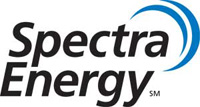
Spectra Energy Corp, headquartered in Houston, Texas, operated in three key areas of the natural gas industry: transmission and storage, distribution, and gathering and processing. Spectra was formed in late 2006 from the spin-off from Duke Energy. Spectra owned the Texas Eastern Pipeline (TETCo), a major natural gas pipeline which brings gas from the Gulf of Mexico coast in Texas to the New York City area, which was one of the largest pipeline systems in the United States. Spectra also operated three oil pipelines. In February 2017, Spectra Energy merged into the Canadian company Enbridge.

Dominion Energy, Inc., commonly referred to as Dominion, is an American energy company headquartered in Richmond, Virginia that supplies electricity in parts of Virginia, North Carolina, and South Carolina and supplies natural gas to parts of Utah, Idaho and Wyoming, West Virginia, Ohio, Pennsylvania, North Carolina, South Carolina, and Georgia. Dominion also has generation facilities in Indiana, Illinois, Connecticut, and Rhode Island.

The Dakota Access Pipeline Protests, also known by the hashtag #NoDAPL, were a series of grassroots Native American protests against the construction of the Dakota Access Pipeline in the northern United States that began in April 2016. Protests ended on February 23, 2017 when National Guard and law enforcement officers evicted the last remaining protesters.
Fossil fuel regulations are part of the energy policy in the United States and have gained major significance with the nation's strong dependence on fossil fuel-based energy. Regulatory processes are established at the federal and state level due to the immense economic, socio-political and environmental impact of fossil fuel extraction and production. Over 80% of the United States' energy comes from fossil fuels such as coal, natural gas, and oil. The Bush administration was marked by the Energy Policy Act of 2005, which provided a monetary incentive for renewable energy adoption and addressed the issue of climate change. The Obama administration was made up of advocates for renewable energy and natural gas, while Donald Trump built his campaign on promises to revive the coal industry.
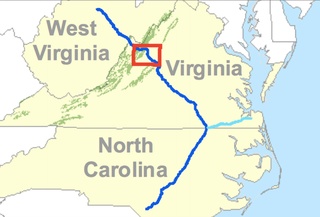
The Atlantic Coast Pipeline was a planned natural gas pipeline slated to run 600 miles (970 km) from West Virginia, through Virginia, to eastern North Carolina. It was canceled in July 2020.
The Bayou Bridge Pipeline (BBP) is a 162.5-mile crude oil pipeline from Lake Charles, Louisiana to St. James, Louisiana by Bayou Bridge, LLC, a subsidiary of Energy Transfer Partners. Communities directly impacted by the pipeline voiced health, economic, and environmental concerns. They filed a lawsuit in opposition to the project and asked the Army Corps of Engineers for an Environmental Impact Statement. The Corps refused to do so and approved the project on 15 December 2017. Water protectors at L'eau Est La Vie camp consistently disrupted construction of the BBP for most of 2018, causing delays and millions of dollars in added cost to the project. They raised environmental justice and social justice issues and concerns about the pipeline's contribution to climate change. The pipeline was eventually completed in April 2019.

The Mountain Valley Pipeline (MVP) is a natural gas pipeline being constructed from northwestern West Virginia to southern Virginia. The MVP will be 304 miles (489 km) long, and there is also a proposed Southgate Extension which will run 75 miles (121 km) from Virginia into North Carolina. The completed pipeline will have a capacity of 2 million dekatherms (Dts) of natural gas per day, with gas produced from the Marcellus and Utica shale formations.
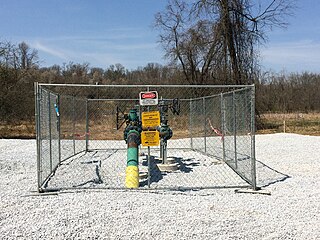
The Mariner East pipelines are a series of Natural Gas Liquids pipelines under construction in the US state of Pennsylvania. The pipelines are intended to facilitate the transfer of Natural Gas Liquids from the Utica Shale and Marcellus Shale Formations to ports on the eastern seaboard where the ethane, butane, pentane, propane mix will be shipped to Scotland for plastics production. The construction of the pipelines generated considerable controversy inside Pennsylvania. Construction on the pipelines, dubbed Mariner East 1, 2, and 2X, is being undertaken by Sunoco Pipeline.

The Dakota Access Pipeline (DAPL) or Bakken pipeline is a 1,172-mile-long (1,886 km) underground pipeline in the United States that has the ability to transport up to 750,000 barrels of light sweet crude oil per day. It begins in the shale oil fields of the Bakken Formation in northwest North Dakota and continues through South Dakota and Iowa to an oil terminal near Patoka, Illinois. Together with the Energy Transfer Crude Oil Pipeline from Patoka to Nederland, Texas, it forms the Bakken system. The pipeline transports 40 percent of the oil produced in the Bakken region.
References
- ↑ Fletcher, Carlton (17 July 2015). "Albany pipeline protesters take cause to Sabal Trail office". Albany Herald. Albany, Georgia. Retrieved 29 October 2015.
- ↑ Adgie, Joe (22 October 2014). "Residents protests Sabal Trail". Valdosta Daily Times. Valdosta, GA. Retrieved 29 October 2015.
- ↑ Adgie, Joe (27 October 2015). "EPA demands Sabal redirect from Floridan Aquifer". Valdosta Daily Times. Valdosta, GA. Retrieved 29 October 2015.
- ↑ Sinkhole raises collapse concerns at pipeline drilling site, WTLV , Anne Schindler, December 5, 2016. Retrieved 18 June 2017.
- ↑ Bluestein, Greg (27 October 2015). "Feds deliver blow to proposed Sabal Trail pipeline running through Georgia". The Atlanta Journal-Constitution. Atlanta, Georgia. Retrieved 29 October 2015.
- ↑ Wiggens, Shannon (3 February 2016). "Sabal Trail pipeline construction is approved". WALB. Albany, Georgia. Retrieved 19 November 2016.
- ↑ Curry, Christopher (12 August 2016). "Army Corps of Engineers OKs permits for Sabal Trail in Florida". Gainesville Sun. Gainesville, Florida. Retrieved 18 November 2016.
- ↑ Swirko, Cindy (12 November 2016). "Protesters arrested at Sabal Trail construction site". Gainesville Sun. Gainesville, Florida. Retrieved 19 November 2016.
- ↑ Caplan, Andrew. "Protesters 'rescued' from Sabal Trail pipe". Ocala.com. Retrieved 2021-07-26.
- ↑ "Police kill man reportedly seen shooting at gas pipeline". CBS News. 26 February 2017. Retrieved 27 February 2017. []
- ↑ Vaughn, Derrek (18 November 2016). "Watershed Coalition protests pipeline". The Valdosta Daily Times. Valdosta, Georgia. Retrieved 19 November 2016.
- ↑ Sabal Trail Transmission (27 November 2016). BI-WEEKLY CONSTRUCTION STATUS REPORT (Report). Sabal Trail Transmission. p. 12. Retrieved 4 December 2016.